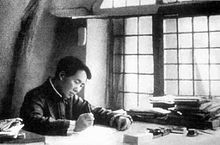माओ से-तुंग
| माओ से-तुंग | |
|---|---|
 माओ से तुंग | |
| जन्म |
२६ दिसम्बर १८९३ शाओशान, शिआंगतान, हूनान, चिंग राजवंश |
| मौत |
९ सितम्बर १९७६ बीजिंग, चीन |
| राष्ट्रीयता | चीनी |
| उपनाम | माओ |
| प्रसिद्धि का कारण | क्रान्ति, राजनीति |
| राजनैतिक पार्टी | कम्यूनिस्ट पार्टी |
| धर्म | नास्तिक |
| जीवनसाथी |
लुओ यिशिउ (१९०७-१९१०) यांग काइहुइ (१९२०-१९३०) हे ज़िझेन (१९३०-१९३७) जांग चिंग (१९३९-१९७६) |
माओ से-तुंग या माओ ज़ेदोंग (毛泽东, Mao Zedong अथवा Mao Tse-tung; जन्म: २६ दिसम्बर १८९३; निधन: ९ सितम्बर १९७६) चीनी क्रान्तिकारी, राजनैतिक विचारक और साम्यवादी (कम्युनिस्ट) दल के नेता थे जिनके नेतृत्व में चीन की क्रान्ति सफल हुई। उन्होंने जनवादी गणतन्त्र चीन की स्थापना (सन् १९४९) से मृत्यु पर्यन्त (सन् १९७६) तक चीन का नेतृत्व किया। मार्क्सवादी-लेनिनवादी विचारधारा को सैनिक रणनीति में जोड़कर उन्होंनें जिस सिद्धान्त को जन्म दिया उसे माओवाद नाम से जाना जाता है।
वर्तमान में कई लोग माओ को एक विवादास्पद व्यक्ति मानते हैं परन्तु चीन में वे राजकीय रूप में महान क्रान्तिकारी, राजनैतिक रणनीतिकार, सैनिक पुरोधा एवं देशरक्षक माने जाते हैं। चीनियों के अनुसार माओ ने अपनी नीति और कार्यक्रमों के माध्यम से आर्थिक, तकनीकी एवं सांस्कृतिक विकास के साथ विश्व में प्रमुख शक्ति के रूप में ला खड़ा करने में मुख्य भूमिका निभाई। वे कवि, दार्शनिक, दूरदर्शी महान प्रशासक के रूप में गिने जाते हैं।
इसके विपरीत, माओ के 'ग्रेट लीप फॉरवर्ड' (Great Leap Forward) और 'सांस्कृतिक क्रांति' नामक सामाजिक तथा राजनीतिक कार्यक्रमों के कारण गंभीर अकाल की सृजना होने के साथ चीनी समाज, अर्थव्यवस्था तथा संस्कृति को ठेस पहुंचाने की भी बातें की जाती हैं, जिसके कारण संसार में सन् १९४९ से १९७५ तक करोडों लोगों की व्यापक मृत्यु हुई बताई जाती हैं।[1] माओ संसार के सबसे प्रभावशाली व्यक्तियों में गिने जाते हैं।[2] टाइम पत्रिका के अनुसार २०वीं सदी के १०० सबसे प्रभावशाली व्यक्तियों में माओ आते हैं।[3]
प्रारम्भिक जीवन
[संपादित करें]माओ का जन्म २६ दिसम्बर १८९३ में हूनान प्रान्त के शाओशान क़स्बे में हुआ।[4] उनके पिता एक ग़रीब किसान थे जो आगे चलकर एक धनी कृषक और गेहूँ के व्यापारी बन गए। ८ साल की उम्र में माओ ने अपने गाँव की प्रारम्भिक पाठशाला में पढ़ना शुरू किया लेकिन १३ की आयु में अपने परिवार के खेत पर काम करने के लिए पढ़ना छोड़ दिया। बाद में खेती छोड़कर वे हूनान प्रान्त की राजधानी चांगशा में माध्यमिक विद्यालय में पढ़ने गए। जिन्हाई क्राति के समय माओ ने हूनान के स्थानीय रेजिमन्ट में भर्ती होकर क्रान्तिकारियों की तरफ से लड़ाई में भाग लिया। चिंग राजवंश के सत्ताच्युत होने पर वे सेना छोड़कर पुनः विद्यालय गए। सन् १९१८ में स्नातक बनने के बाद् सन् १९१९ को चार मई आन्दोलन के लिए अपने शिक्षक एवं भविष्य के ससुर प्राध्यापक यां च्यां जि के साथ बेइजिंग की यात्रा पर गए। प्राध्यापक यां च्यां जि पीकिंग विश्वविद्यालय में महत्वपूर्ण पद पर थे और उनकी सिफारिश पर माओ ने सहायक पुस्तकालयाध्यक्ष पद पर रहकर काम किया। माओ ने अंशकालिक (part-time) छात्र के रूप में पंजीकृत होकर कुछ व्याखानों और विद्वानों के सेमिनारों में भी भाग लिए। शंघाई में रहते वे साम्यवादी सिद्धान्त में अध्ययन में लगे।

सन् १९३८
स्रोत
[संपादित करें]- ↑ Death Toll Median Average Estimates of 14 Sources = 45.75 - 52.5 million people Archived 2016-06-04 at the वेबैक मशीन Which include the books: Le Livre Noir du Communism by Stephane Courtois, Hungry Ghosts: Mao's Secret Famine by Jasper Becker, China's Changing Population by Judith Banister, Contemporary Chinese Population by Wang Weizhi, Mao: The Unknown Story by Jung Chang, Victims of Politics by Kurt Glaser, How to Prevent Genocide by John Heidenrich, Mao's China and After by Maurice Meisner, The Human Cost of Communism in China by Robert L. Walker. Along with reports by Agence France Press (1999), Dictionary of 20 Century World History, Guinness Book of World Records, Washington Post (1994), and the Weekly Standard (1997)
- ↑ Mao Zedong Archived 2006-03-21 at the वेबैक मशीन, The Oxford Companion to Politics of the World, Accessed 2008-08-23
- ↑ Time 100: Mao Zedong Archived 2009-08-27 at the वेबैक मशीन By Jonathan D. Spence, 13 अप्रैल 1998.
- ↑ The Rough Guide to China Archived 2014-07-25 at the वेबैक मशीन, David Leffman, Martin Zatko, Penguin, 2011, ISBN 978-1-4053-8908-2, ... Mao Zedong's birthplace, the hamlet of SHAOSHAN (韶山, sháoshān), lies 90km to the southwest of Changsha, a fine day-trip from the provincial capital through the Hunanese countryside ...
इन्हें भी देखें
[संपादित करें]बाहरी कड़ियाँ
[संपादित करें]- चीन में माओ की क्रांति का क्या हुआ ? (बीबीसी हिन्दी)
Text is available under the CC BY-SA 4.0 license; additional terms may apply.
Images, videos and audio are available under their respective licenses.
